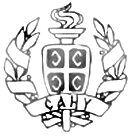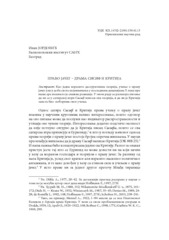Право јачег - драма Сисиф и Критија
The right of the stronger: The play Sisyphus and Critias
| dc.creator | Jordović, Ivan | |
| dc.date.accessioned | 2018-11-09T13:14:04Z | |
| dc.date.available | 2018-11-09T13:14:04Z | |
| dc.date.issued | 2004 | |
| dc.identifier.issn | 0350-7653 | |
| dc.identifier.uri | https://dais.sanu.ac.rs/123456789/4193 | |
| dc.description.abstract | The focus of this study is the standpoint of the play Sisyphus and Critias the leader of the thirty towards the right of the stronger. this is a question of constant interest in scientific circles, since its answer can serve as the indicator of the influence this famous theory has had. this interest has been encouraged by the fact that critias’ authorship of the play is questionable. however, the question of the author is not of primary importance for this article, because there are some arguments, among some well known ones, which were not considered and which Show that in this satire, regardless of the author and the purpose of this fragment, the right of the stronger is actually non-existant. the first argument to support this theory is that nomosphysis antithesis is nowhere explicitly mentioned although it is the crucial element of the right of the stronger. in addition there is no claim in the play that the exploitation of the strong by the week or by law accrued. the second argument is that despite the incapability of laws to prevent the secret injustice, they and their importance for the human society are depicted in a positive light. it should also be noted that, unlike callicles and glaucon, laws are created to stop the bad and not the good. the third argument is that the invention of religion is accepted as a positive achievement, which finally enables the overcoming of primeval times and lawlessness. the reflection of this argument is a positive characterization of the individual who invented the fear of gods. the fourth argument, which has not been taken into consideration so far is the way the supporters and opponents of lawlessness are described and marked as κακοί and έσξλοί in the satire only physically strong are considered as strong as opposed to callicles, where they are also spiritually superior. intelectually superior in Sisyphus is the inventor of the fear of gods who is also in favor of law and order. the fact that the strong are described as kako¿ while the supporter of law are recognized as έσξλοί is also of great importance. in other words, this division reflects strong influence of aristocratic set of values by which the έσξλοί are in every way superior to the κακοί. some other indications Show that critias cannot be listed as a advocate of the right of the stronger regardless of our previous conclusion about the play. we need to bear in mind the fact that critias has only recently been linked with the theory of the right of the stronger. in the classical period there had been non attempt to explain his ruthless politics in Athens 404/403 BC by Means of the right of the stronger. what is more, no indication that he supported this theory were found. unlike xenophon and philostratus, it is very likely that Plato and Aristotle were mild to critias Due to his family ties with Plato and his friendship with Socrates. however, all the four of them would have stated that critias was an upholder of the right of the stronger if he had actually been that. that way Socrates would have been completely acquitted of the responsibility for the crimes critias had committed, because of the possible assertion that critias was misled by this theory and succumbed to the negative influence of the sophistic teachings. based on these arguments we can conclude that there is no trace of the right of the stronger in the play Sisyphus and that critias did not support this theory. this satirical play and critias were Most probably under a great influence of aristocratic beliefs, which were often scientifically misinterpreted as the reflection of the right of the stronger. | en |
| dc.description.abstract | Kao jedna izrazito destruktivna teorija, učenje o pravu jačeg još u doba svoga pojavljivanja u poslednjim decenijama 5. veka pre naše ere izazvalo je snažne reakcije. U ovom radu se razmatra pitanje da li se u satirskoj igri Sisif iznosi ova teorija, i da li je Kritija zaista bio pobornik ovog učenja. | sr |
| dc.rights | openAccess | |
| dc.rights.uri | https://creativecommons.org/licenses/by-nc-sa/4.0/ | |
| dc.source | Balcanica | |
| dc.subject | Sisyphus | |
| dc.subject | Critias | |
| dc.subject | satire | |
| dc.title | Право јачег - драма Сисиф и Критија | sr |
| dc.title | The right of the stronger: The play Sisyphus and Critias | en |
| dc.type | article | |
| dc.rights.license | BY-NC-SA | |
| dcterms.abstract | Јордовић Иван; Pravo jačeg - drama Sisif i Kritija; | |
| dc.citation.spage | 51 | |
| dc.citation.epage | 70 | |
| dc.citation.issue | 35 | |
| dc.identifier.doi | 10.2298/BALC0535051J | |
| dc.type.version | publishedVersion | en |
| dc.identifier.fulltext | https://dais.sanu.ac.rs/bitstream/id/25969/0350-76530535051J.pdf | |
| dc.citation.other | (35): 51-70 | |
| dc.identifier.rcub | https://hdl.handle.net/21.15107/rcub_dais_4193 |

